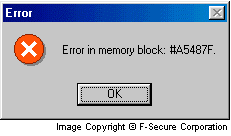IRC-Worm:W32/Fagot
Summary
A standalone malicious program which uses computer or network resources to make complete copies of itself.
Removal
Based on the settings of your F-Secure security product, it will either move the file to the quarantine where it cannot spread or cause harm, or remove it.
A False Positive is when a file is incorrectly detected as harmful, usually because its code or behavior resembles known harmful programs. A False Positive will usually be fixed in a subsequent database update without any action needed on your part. If you wish, you may also:
-
Check for the latest database updates
First check if your F-Secure security program is using the latest updates, then try scanning the file again.
-
Submit a sample
After checking, if you still believe the file is incorrectly detected, you can submit a sample of it for re-analysis.
Note: If the file was moved to quarantine, you need to collect the file from quarantine before you can submit it.
-
Exclude a file from further scanning
If you are certain that the file is safe and want to continue using it, you can exclude it from further scanning by the F-Secure security product.
Note: You need administrative rights to change the settings.
Technical Details
Fagot is an IRC worm that works by sending messages via IRC chat, trying to get people to click on a web link, which would download "britney.jpg" from www.angelfire.com. The britney.jpg file isn't actually a picture, but a HTML page that contains a script code. When the downloaded HTML page is opened with Internet Explorer, the script is executed. The first part of the script contain Visual Basic Script code that uses an exploit to replace the Windows Media Player with a file ("patch.exe") that is downloaded from another web location. Next the second part (written with JavaScript) of the script is executed, causing the replaced medial player to execute after five seconds. The "patch.exe" file was taken offline already by the time we got reports on this worm on Sunday the 26th of October, therefore the worm doesn't work any more.
History
The first variant which was found in the end of October 2003. The spread of the worm was quickly stopped, as a web file it needed was taken offline.
A new variant of Fagot was discovered November 11th, 2003. This variant uses the link that points to home.amis.net. However, this variant of the worm is also stopped, as the file at the web site was removed.
Execution
The PATCH.EXE file is the worm's component responsible for killing anti-virus and security software tasks and for sending links to the infected HTML file to IRC networks. The file is a Windows PE executable compressed with UPX file compressor. The packed size is 156 kilybytes, the unpacked size is about 382 kilobytes. When the PATCH.EXE file is run, it does the following: * Kills processes with the following names:
- Ad-watch.exe
- regedit.exe
- taskmgr.exe
* Copies the worm's file to Windows System folder with the following name:
- C:\Windows\system32\userinit32.exe
* Creates a startup key for the copied file in System Registry:
- [HKLM\SOFTWARE\Microsoft\Windows NT\CurrentVersion\Winlogon] "Userinit" = "C:\Windows\system32\userinit32.exe"
* Copies the worm's file to Windows System folder with the following name:
- C:\Windows\system32\dllhost32.exe
* Creates a startup key for the copied file in System Registry:
- [HKLM\Software\Microsoft\Windows\CurrentVersion\Run] "dllhost32" = "C:\Windows\system32\dllhost32.exe"
* Kills the following processes:
- FSGK32.EXE
- FSM32.EXE
- FSMA32.EXE
- FSMB32.EXE
- FWENC.EXE
- KAVLITE40ENG.EXE
- KAVPERS40ENG.EXE
- NAV Auto-Protect
- NAVAPSVC.EXE
- NMAIN.EXE
- NORMIST.EXE
- NORTON_INTERNET_SECU_3.0_407.EXE
- NPF40_TW_98_NT_ME_2K.EXE
- NPFMESSENGER.EXE
- NPROTECT.EXE
- NPSSVC.EXE
- NSCHED32.EXE
- NTVDM.EXE
- ZAPRO.EXE
- ZAPSETUP3001.EXE
- ZATUTOR.EXE
- ZAUINST.EXE
- ZONALM2601.EXE
- ZONEALARM.EXE
- _AVP32.EXE
- _AVPCC.EXE
- _AVPM.EXE
- ccEvtMgr.exe
- ccSetMgr.exe
- FSAV32.exe
- FSMA32.exe
- FSMB32.exe
- FSSM32.exe
- AVNT.exe
- AVP.exe
- BLACKICE.exe
- FPROT.exe
- FP-WIN.exe
- N32SCANW.EXE
- NAVAPW32.EXE
- PAVCL.EXE
- PAVSCHED.EXE
- WFINDV32.EXE
- NAVW32.EXE
- BlackICE.exe
* Changes the startup page of Internet Explorer to:
- www.blacksnake.com
* Changes default Windows logon names to:
- COCK_SUCKING_FAGGOT
* Deletes the following files if they are present:
- C:\windows\regedit.exe
- C:\windows\cmd.exe
- C:\windows\system32\taskman.exe
- C:\windows\system32\taskmgr.exe
- C:\windows\system32\regedt32.exe
- C:\windows\system32\regsvr32.exe
- C:\windows\TASKMAN.exe
- C:\windows\system32\autochk.exe
- C:\windows\system32\chkntfs.exe
- C:\windows\system32\chkdsk.exe
- C:\windows\system32\shutdown.exe
- C:\windows\NOTEPAD.exe
- C:\WINDOWS\system32\userinit.exe
- C:\windows\system32\progman.exe
- C:\windows\regedit.exe
- C:\windows\cmd.exe
- C:\windows\system32\taskman.exe
- C:\windows\system32\taskmgr.exe
- C:\windows\system32\regedt32.exe
- C:\windows\system32\regsvr32.exe
- C:\windows\TASKMAN.exe
- C:\windows\system32\autochk.exe
- C:\windows\system32\chkntfs.exe
- C:\windows\system32\chkdsk.exe
- C:\windows\system32\shutdown.exe
- C:\windows\NOTEPAD.exe
- C:\WINDOWS\system32\userinit.exe
- C:\windows\system32\progman.exe
- C:\windows\system32\ntoskrnl.exe
- C:\windows\system32\ntkrnlpa.exe
- C:\windows\system32\alg.exe
- C:\windows\system32\bootok.exe
- C:\windows\system32\chcp.exe
- C:\windows\system32\ctfmon.exe
- C:\windows\system32\dumprep.exe
- C:\windows\system32\recover.exe
- C:\windows\system32\imapi.exe
- C:\windows\system32\logon.exe
- C:\windows\system32\MDM.exe
- C:\windows\system32\services.exe
- C:\windows\system32\systray.exe
- C:\windows\system32\win.exe
- C:\windows\system32\wowexec.exe
- C:\windows\system32\wuauclt.exe
* Copies itself with different names:
- C:\windows\NOTEPAD.exe
- C:\WINDOWS\system32\userinit.exe
- C:\windows\system32\progman.exe
- C:\windows\regedit.exe
- C:\windows\system32\ntoskrnl.exe
- C:\windows\system32\autochk.exe
- C:\windows\system32\chkntfs.exe
- C:\windows\system32\shutdown.exe
- C:\windows\system32\ntkrnlpa.exe
- C:\windows\system32\alg.exe
- C:\windows\system32\bootok.exe
- C:\windows\system32\chcp.exe
- C:\windows\system32\ctfmon.exe
- C:\windows\system32\dumprep.exe
- C:\windows\system32\imapi.exe
- C:\windows\system32\logon.exe
- C:\windows\system32\MDM.exe
- C:\windows\system32\recover.exe
- C:\windows\system32\services.exe
- C:\windows\system32\systray.exe
- C:\windows\system32\win.exe
- C:\windows\system32\wowexec.exe
- C:\windows\system32\wuauclt.exe
* Deletes the following Registry tree branches:
- HKCR\
- HKLM\HARDWARE
- HKLM\SAM
- HKLM\SECURITY
- HKLM\SOFTWARE
- HKLM\SYSTEM
- HKCC\Software
- HKCC\System
- HKCU\Software\Microsoft\Internet Explorer\Desktop\SafeMode
- HKCU\Printers
- HKCU\SessionInformation
- HKLM\SYSTEM\ControlSet001\Control\SafeBoot
- HKLM\SYSTEM\\ControlSet003\\Control\\SafeBoot
- HKLM\SYSTEM\CurrentControlSet\Control\SafeBoot
- HKLM\SYSTEM\MountedDevices
- HKLM\SYSTEM\LastKnownGoodRecovery
- HKLM\SYSTEM\ControlSet001\Control\ContentIndex\Catalogs\System
- HKLM\SYSTEM\ControlSet001\Control\Biosinfo
* Shows a fake error messagebox:

* Periodically sends the following message through mIRC chat client:
- http://www.angelfire.com/celeb2/picsx/britney.jpg <- uuh, check it out !! :D
The above changes usually severely damage Windows operating system and it has to be reinstalled.